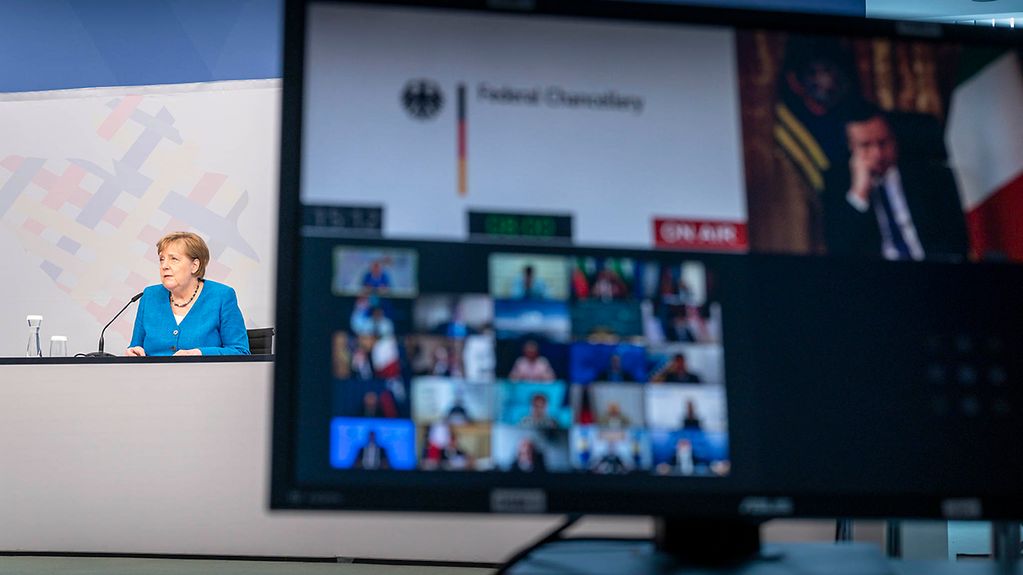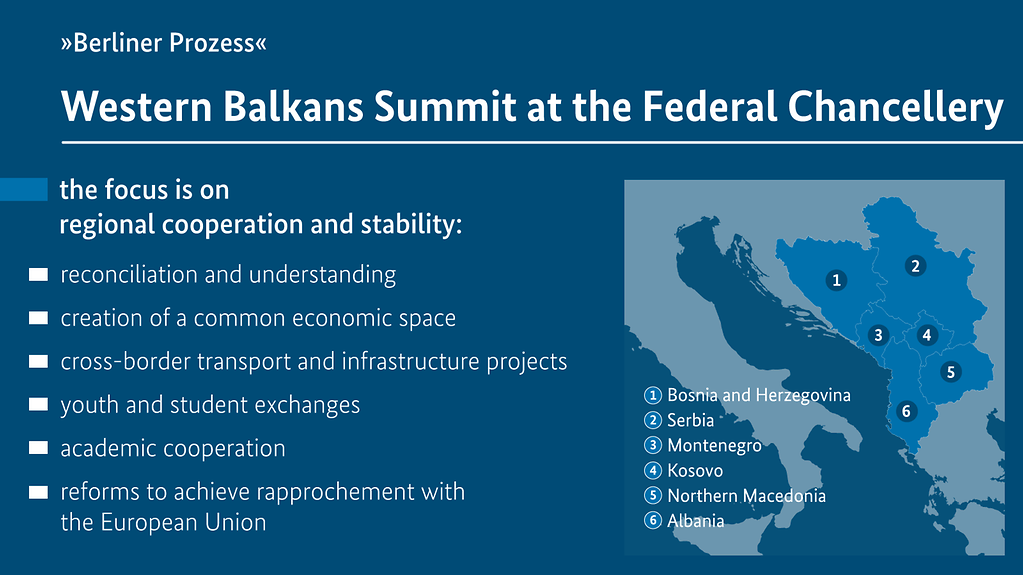The “Berlin Process”
Federal Chancellor Merkel virtually hosted a meeting of the heads of state and government of the six Western Balkan countries at the Federal Chancellery on Monday. Together with colleagues from other EU states, she engaged in talks at the 8th Western Balkans Summit as part of the “Berlin Process”.
4 min reading time

Virtual dialogue: Federal Chancellor Merkel chaired the Western Balkans Summit from the Federal Chancellery.
Photo: Federal Government/Bergmann
As at previous Western Balkans conferences, the virtual summit in Berlin, which Federal Chancellor Angela Merkel was chairing for the second time, focused on expanding and deepening regional cooperation among the Western Balkan states. Enhancing relations among the people of the region and bringing about rapprochement with the European Union remain pivotal factors for the future. As the Federal Chancellor told the press at the end of the talks, this process is very much in the interests of the EU, too.
After all, she said, there were sound geostrategic reasons for achieving the primary goal of further reconciliation and understanding among the countries involved. “There have been ups and downs in recent years,” said Merkel, adding: “Much remains to be done.”
Significant progress since 2014
Despite all the difficulties facing reconciliation, however, Merkel said there had also been “numerous instances of success on the ground”. A solid foundation was laid in the area of youth and student exchange with the establishment of the Western Balkans Youth Forum, for instance – the first Western Balkans Youth Forum assembled last week. What seemed unthinkable for many years is now beginning to emerge as a tangible possibility: young people from different ethnic, linguistic and religious backgrounds are coming together. This was “practical groundwork dedicated to peaceful coexistence in the future”, as the Federal Chancellor had previously stressed in her podcast prior to the summit.
Since the “Berlin Process” got underway, sound progress has been made in vocational training and further education, as well as mutual recognition of university degrees and academic cooperation. Merkel noted that there was still much to be done, however.
Considerable progress has been made in boosting the transport and energy infrastructure to boost links in the region, and annual conferences are now held in the field of research and civil society, too. A Green Agenda has also been launched, and there are Green Lanes to speed up domestic transport. This had been especially important for the transportation of goods required for combating the pandemic, said the Federal Chancellor. On this topic, she announced that three million vaccine doses would be made available for the Western Balkans.

Expand cooperation among the Western Balkan states and create a basis of mutual trust – this is what the Berlin Process is seeking to achieve.
The graphic is entitled Western Balkans Summit at the Federal Chancellery. Underneath it says: the focus is on regional cooperation and stability. Below this, the following points are listed: reconciliation and understanding; creation of a common economic space; cross-border transport and infrastructure projects; youth and student exchanges; academic cooperation; reforms to achieve rapprochement with the European Union. Next to this there is a map of the region. The countries shown are Bosnia and Herzegovina, Serbia, Montenegro, Kosovo, Northern Macedonia and Albania.
Photo: Federal Government
A lot of patience still needed
The “Berlin Process” had “brought the region closer together”, said Merkel, and as a result there had been a noticeable intensification of contacts between the heads of the Western Balkan governments. Nonetheless, “unforeseeable problems” repeatedly emerged, she added. After the name dispute between Greece and Northern Macedonia had been resolved, there were now discussions between Northern Macedonia and Bulgaria, she said. Peaceful coexistence between Serbia and Kosovo likewise faced considerable challenges, she noted, and there was still great instability in Bosnia and Herzegovina. This was why Christian Schmidt had joined the talks as the designated High Representative in Bosnia and Herzegovina, said Merkel. “A lot of patience is still needed,” the Federal Chancellor stressed.
Strategic goal: rapprochement with the EU
The current focus is on creating a common market with the aim of establishing the four fundamental EU freedoms within the Western Balkan states. Here the Federal Chancellor highlighted the abolition of additional roaming charges among the six Western Balkan countries as a key practical measure that would impact on the day-to-day life of all citizens in the region and break down barriers between the states. This came into force on 1 July.
The strategic goal remains to achieve rapprochement between the Western Balkan states and the EU to enable EU membership after extensive reforms. Merkel said that “some success has been achieved” in this area, not least due to the opening of accession chapters based on a cluster model. The speed of progress might be “too slow for many”, she said, but the process in Albania could be regarded as “a good example”. As such, it had been “the right decision to open up the ‘Berlin Process’ in 2014” as this had allowed the Western Balkan states to tap into a “whole new dimension”, she said.
Last but not least, the EU had to consider its own internal organisation, the Chancellor said: “How can enable new members to join again?” French President Macron, who also attended the conference, had in any case committed himself to the perspective of EU membership for the Western Balkan states, said Merkel, and this process could only succeed if regional cooperation was expanded, based on mutual trust: “Reconciliation is still necessary: this means coming to terms with the past and doing everything we can to ensure that the young generation in these countries can live peaceful and fulfilled lives,” as the Federal Chancellor had previously stated in her podcast.
The “Berlin Process” is a conference series that was launched by the Federal Chancellor in 2014 on the occasion of the first Western Balkans Conference in Berlin. Since then, participating countries have included the six Western Balkan states (“WEB6”) Albania, Bosnia and Herzegovina, Kosovo, Montenegro, Northern Macedonia and Serbia. They all have a perspective of EU membership.
The co-initiators are Austria, France, the UK, Italy, Croatia, Poland and Slovenia as well as the EU Commission. Other states such as Bulgaria and Greece also participate on a case-by-case basis, as do representatives of international organisations.